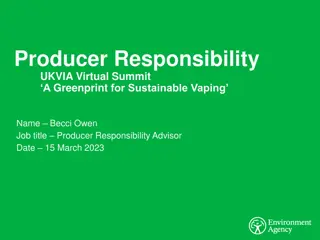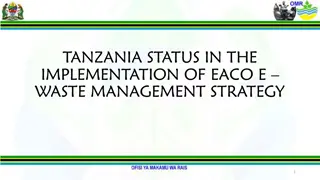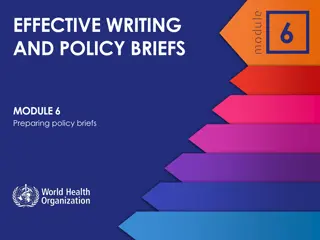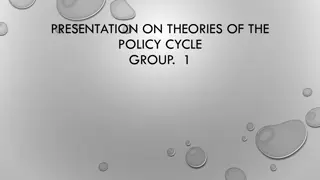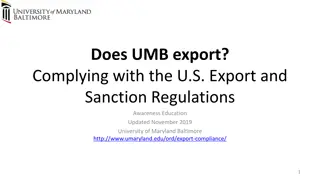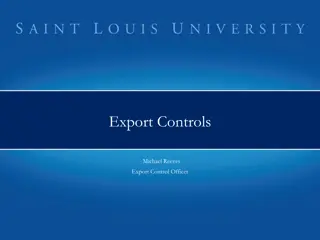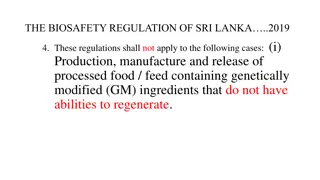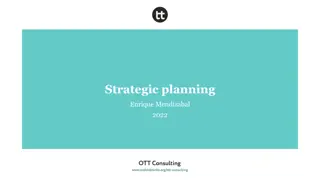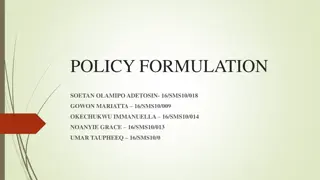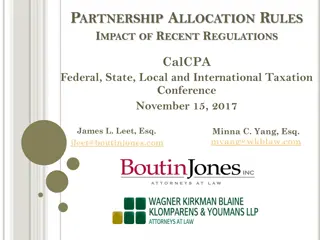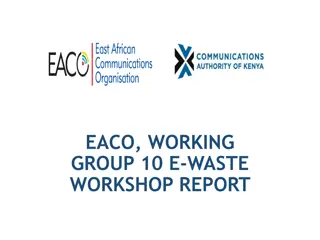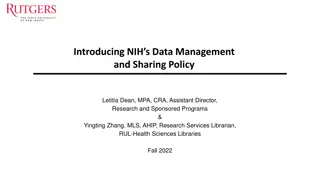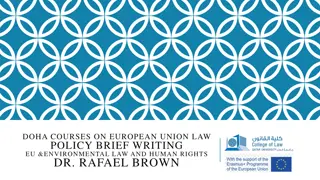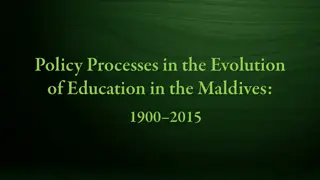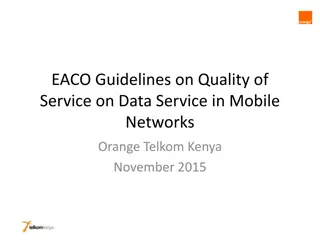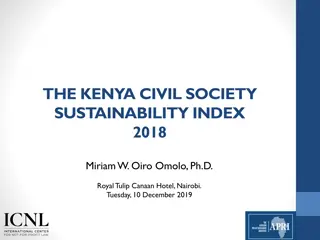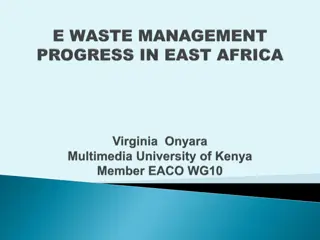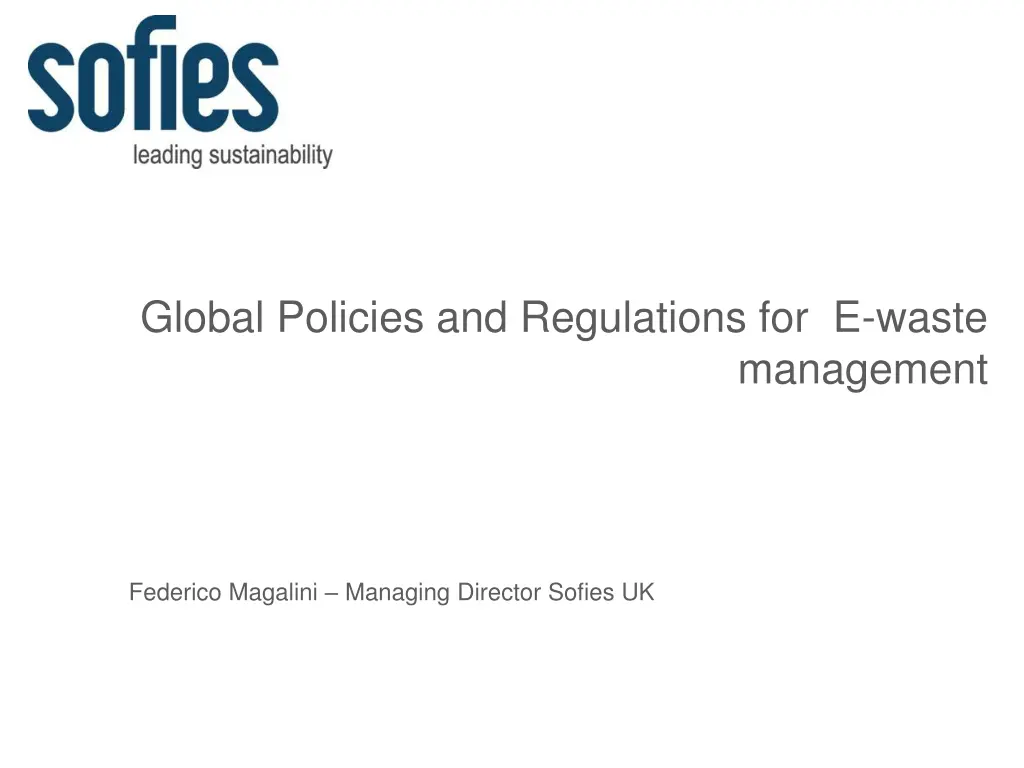
E-Waste Management Policies and Global Regulations by Federico Magalini
Learn about global policies and regulations for e-waste management presented by Federico Magalini, Managing Director at Sofies UK, including the need for standards, who pays for waste management, Extended Producer Responsibility (EPR) theory vs practice, and the practical implications of EPR in waste management.
Download Presentation

Please find below an Image/Link to download the presentation.
The content on the website is provided AS IS for your information and personal use only. It may not be sold, licensed, or shared on other websites without obtaining consent from the author. If you encounter any issues during the download, it is possible that the publisher has removed the file from their server.
You are allowed to download the files provided on this website for personal or commercial use, subject to the condition that they are used lawfully. All files are the property of their respective owners.
The content on the website is provided AS IS for your information and personal use only. It may not be sold, licensed, or shared on other websites without obtaining consent from the author.
E N D
Presentation Transcript
Global Policies and Regulations for E-waste management Federico Magalini Managing Director Sofies UK
Global landscape for e-waste generated (2016 data) Generation total amount Source: UNU Global E-waste Monitor 2017 (2016 data) 14 May 2018 EACO E-waste workshop - Kigali 2
Overview East Africa Source: UNU Global E-waste Monitor 2017 (2016 data) 14 May 2018 EACO E-waste workshop - Kigali 3
Where and why do we need standards, rules & policies? Setting the rules Pushing for BAT Business Perspective Shaping operations Environmental (societal) Perspective 14 May 2018 EACO E-waste workshop - Kigali 4
WHO is really paying for waste management Three options existing: Tax-payers Consumers (or waste holders) Producers (EPR) No matter who is paying cost-effectiveness is a paramount: Minimize taxes = Society happy (votes) Low costs = consumers happy (growing economy) EPR = increase price ( ) or decrease margins (risk for SMEs & markets) 14 May 2018 EACO E-waste workshop - Kigali 5
EPR: Theory vs Practice Producers = not only OEMs (but any player making profits out of selling new/used products) Local assembler, Local importer, Local producer/distributor + EOL (EPR) OEM = Product Design + Manufacturing SEPARATE COLLECTION E-waste management is much more than Design for Recycling Efficient & effective collection Downstream markets Use of best suitable technologies TRANSPORT RECYCLE TREATMENT REUSE System Design DISPOSAL 14 May 2018 EACO E-waste workshop - Kigali 6
What does EPR means in practice? Other Costs Each cost is linked to (originated by) activities performed by stakeholders Framework Costs Other EPR Guarantees stretch Awareness Raising Audit Enforcement In certain cases treatment might generate revenues Technical Costs Usual EPR domain Access to Waste Containers Transport Treatment First 3 activities usually represent NET costs 14 May 2018 EACO E-waste workshop - Kigali 7
Key questions to set-up EPR scheme 1. WHO is paying for WEEE Management? (political decision) a. Tax-payers (residual, as long as legislation is being deployed) b. Consumers (e.g. California, upon purchase product) c. Waste holders (e.g. Japan, or non-household streams in EU) d. Producers (Extended Producer Responsibility , 98% of policy bills ), 2. HOW MUCH? (technical + political) 3. TO WHOM? (political) a. State-controlled, monopolistic body (under ministry (f.i. California, Ghana), or ad-hoc created (f.i. Mauritius)) b. Compliance Schemes, to be set-up by Producers (having the responsibility to comply) 4. TECHNICALITIES on how fees are collected (technical) a. When importing products b. Dedicated time-slots 14 May 2018 EACO E-waste workshop - Kigali 8
Is there an unique way to implement EPR? Difference financing models exist: EU WEEE Directive (EPR: Financial + Organizational) California (consumers pay upon purchase) Japan (consumers pay upon disposal) Ghana or China (EPR: Financial only) No matter the model, money raised should be 100% transferred to finance technical and framework costs A tailored solution can be developed for EACO & individual countries How much time do WEEE need? 2 to 3 years if we have strong commitment 14 May 2018 EACO E-waste workshop - Kigali 9
Who are we? 35 Employees 500+ Projects 100 External technical and field experts 5 Offices: 40 Countries Bangalore | Geneva | London Paris | Zurich 14 May 2018 EACO E-waste workshop - Kigali 11
Our Domains of Intervention Smart territories Making territories more sustainable through systemic and integrated approaches Secondary resource and urban mining Turning wastes into resources Sustainable industrial zones Making industrial areas more sustainable and attractive through industrial symbiosis Alternative Energy Systems Developing alternative to fossil fuels with climate positive and renewable energies Sustainable production and processing Ensuring competitive and long term business based on an optimal use of resources and energy 14 May 2018 Managing Sustainability Driving sustainability: Innovate, manage, monitor, asses and report EACO E-waste workshop - Kigali 12
Thank you Q&A: federico.magalini@sofiesgroup.com

